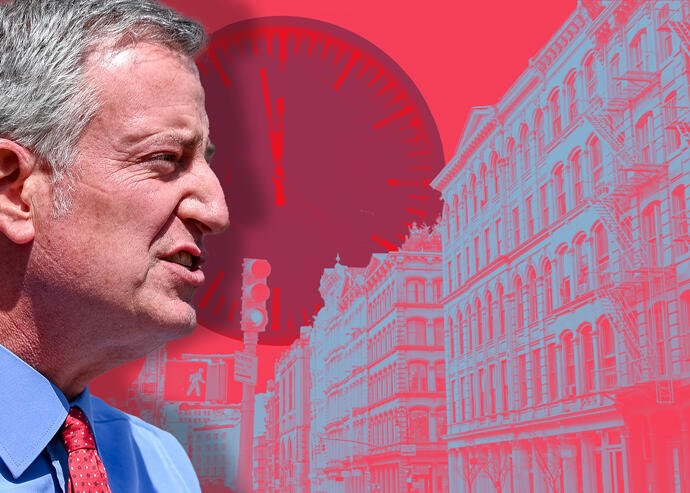
Mayor Bill de Blasio (Getty, iStock)
Less than two weeks after the de Blasio administration claimed victory in one rezoning fight, it is facing yet another.
A new lawsuit seeks to halt the rezoning of Soho and Noho, alleging that the mayor is exploiting the pandemic before his term expires in December.
The Department of City Planning is scheduled to certify the rezoning application on Monday, starting the city’s seven-month review process. The lawsuit asks the court for an emergency order to prevent that.
The complaint, filed by community groups the Soho Alliance and Broadway Residents Coalition, channels a lawsuit opposing a larger but similar rezoning of Gowanus. Both cases allege that rezoning proceedings must be held in-person.
The Gowanus proposal moved ahead this month when a state Supreme Court judge lifted her temporary restraining order blocking it after the city agreed to hold joint outdoor hearings at the same time as virtual proceedings. That agreement could set the ground rules for the Soho hearings.
The attorney in the Gowanus case, Jason Zakai, also represents the Soho plaintiffs. He was not immediately available to discuss the new case.
Any delay in the Soho rezoning could spell its death. In a best-case scenario it would be approved by the City Council with a month left in de Blasio’s tenure. According to the lawsuit, that is why the mayor issued an executive order in March to allow for virtual proceedings.
The complaint calls it an “irrational order” issued in the name of a public emergency, when in fact it was a thinly veiled attempt to ensure key rezonings moved forward before the end of the mayor’s term.
Neither side disputes that administration-sponsored rezonings not resolved this year would be in serious jeopardy. The mayor’s lawyers argued in the Gowanus lawsuit that a delay could leave the rezoning to the next mayor and revamped City Council, and “a new mayoral administration or City Council may not be as supportive and may abandon it.”
The administration, which last year defeated a lawsuit challenging its rezoning of Inwood, expected to be sued over Soho, where some residents and civic groups oppose changes that would allow for substantially larger buildings, a portion of which would be set aside for low-income households.
“We were never going to modernize 50-year-old zoning laws, or build affordable housing in one of the least affordable and least diverse neighborhoods in America, without a good hard fight. So we’re not surprised,” Mitch Schwartz, a spokesperson for the mayor, said in a statement. “But we are prepared — and we’re confident that remote hearings are inclusive and fair, and we will deliver a rezoning plan that moves SoHo and NoHo forward.”
The changes would affect 56 blocks across those neighborhoods, eliminating restrictions that permit only light manufacturing use on ground floors and pave the way for 2 million square feet of new residential space.
Several mayoral candidates have voiced support for the rezoning, noting that it would be the first in an affluent, predominantly white area of Manhattan since the mayor’s Mandatory Inclusionary Housing program was approved in 2016.
Jeff Braun, a land-use attorney at Kramer Levin, said the Gowanus settlement could pressure the city to provide similar accommodations for Soho hearings. But he believes the legal challenge would have been filed regardless, and that opponents simply want to delay the proposals until there is a new mayor and City Council. Like the mayor, Margaret Chin, one of the two Council members who will decide the rezoning’s fate, must leave office this year.
“Having these hearings remotely increases public participation. It doesn’t decrease it,” Braun said, echoing a point that city lawyers have made. “It has always been my sense that this theory [that remote hearings limit access] has always just been a pretext to stop this process from commencing.”



